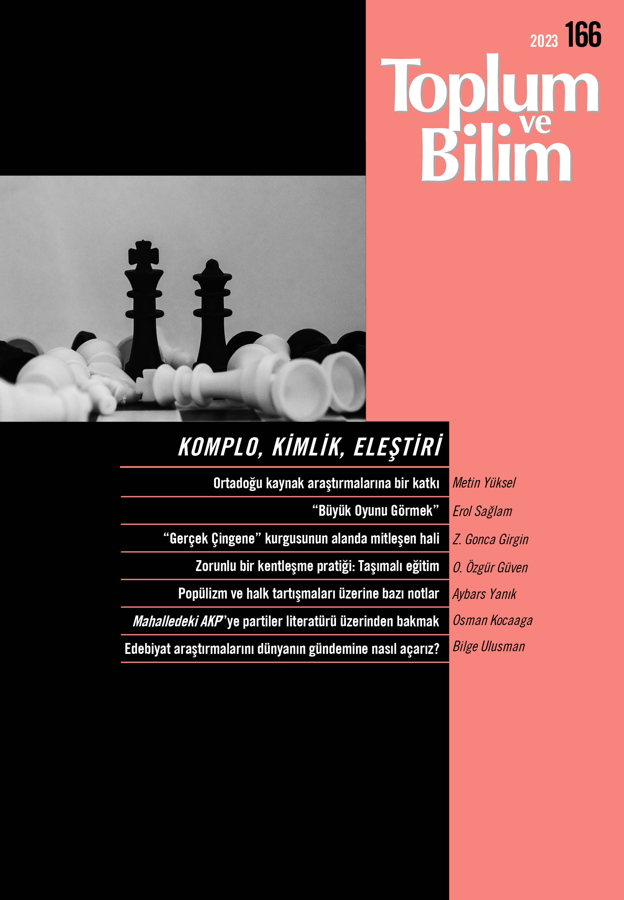A contribution to research on Middle Eastern sources
METİN YÜKSEL
The Kurdish sources produced in Iraq from the 1920s onward generally tend to be overlooked in the existing scholarship. This study aims to contribute to fill in this gap that appears to be mainly a product of state-centric and Eurocentric perspectives. With particular attention to Kurdish books, poetry and periodicals mainly published in Baghdad and Sulaimaniya, alongside Kurdish broadcasts of Radio Baghdad, this paper draws attention to the works produced by both nation-states and Kurdish intelligentsia on the Kurdish language and culture. By covering an extensive list of primary and secondary sources especially in what is commonly known as Kurdish Sorani (Central Kurdish), this study aspires to bring the existence and significance of these sources to the attention of researchers for future research.
Keywords: Iraq, Kurdish, book publishing, poetry, radio broadcasts, periodicals.
“Knowing It All”: Tracing the reverberatios of conspiracy theories at the intersections of natıonalism and everyday politics
EROL SAĞLAM
This article explores the everyday makings of nationalism and nationalist political subjectivities through an analysis of the circulation of conspiracy theories and their concrete socio-political reverberations. Drawing on an ethnographic field research in Trabzon, in northeast Turkey, it attends to the ways in which the circulation of conspiracy theories emerge as productive social practices through which subjectivities ties are issued forth. The article refrains from dismissing conspiracy theories simply as false narratives with considerable epistemological shortcomings symptomatic of 'narrators’ psychological/social disorientation but argues for a shift in our perspectives to capture their transformative and productive potential – especially in terms of their effects on the relationship between the state and the citizenry. The findings of the research are first analyzed to demonstrate the fundamental functions of conventional conspiracy theories, namely their capacity to provide short-cut explanations, to generate binaries between good-us and bad-others, and to continue their circulation even in the face of evidence to the contrary. The analysis then moves on to discuss the nascent functions of conspiracy theories in the 21st century: the public forging of the narrators as knowing subjects, the subjects’ alignment with the ideological fault lines of the state/power, and the generation and legitimation of societal violence. Demonstrating that the circulation of conspiracy theories is productive social practices, the article underlines how everyday nationalism is generated in a bottom-up manner, creating large-scale socio-political effects.
Keywords: Conspiracy theories, nationalism, Trabzon, masculinities, subjectivity.
Hey Gypsy, you are Romani! Mythologizing the “Real Gypsy” in the field
Z. GONCA GİRGİN
This study involves describing the reflection of the discursive construction of Gypsy/Roma belonging in practical environments and the phenomenon of “migration” mythologized through this reflection. In this sense, the main purpose of the study is to draw attention to the modern construction of a cultural group and to explain how local cultural characteristics are reconstructed through “ethnicization”. On the one hand, the study traces the internal marginalization that emerged when the image of the “real Gypsy” built on the silence of Gypsies turned into an internalized practice for Gypsy/Roma communities. In particular, the fact that “Gypsy/Roma” communities have taken on a subaltern content with renewed discourses since the 1990s is considered as an important focal point in this process. The content of the study consists of ethnographic data and the literature used to interpret these data together with the historical process.
Keywords: Gypsy/Roma, ethnizication, “true Gypsy”, migration, inner-othering.
An implementation to forced urbanization: Transported education
O. ÖZGÜR GÜVEN
Capital dynamics based on urban development produce outcomes that displace large populations in Turkey. Focusing on a cross-section of displacement, this text examines the effects of the “transported education” system on the educational mobilization of rural populations. In this context, this study problematizes the access of rural populations to basic education on condition of urbanization; and analyzes the relationship of current educational practices with urban development goals in the axis of neoliberalism debates. The closure of village schools due to the transported education system leads to outcomes that dissolve the qualities of the village as a sociological and economic unit. As revealed in various studies, children in the transported education system commonly face problems such as learning difficulties, transportation safety, hunger and sleep deprivation. Parents who want to avoid the negative effects of this system and provide their children with a better education have the only option of migrating to the city. While the school mobilization of rural populations puts an end to their land-based subsistence relations, it simultaneously reconstructs these populations as subjectivities that broaden the neoliberal education imaginary from below. School becomes a dilemma that is fought to achieve but whose struggle leads to new inequalities.
Keywords: Forced urbanization, neoliberalism, rural population, transported education.

